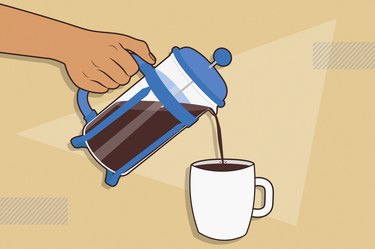
If you're a java-lover who's looking to shed pounds, the coffee diet for weight loss might sound like the ultimate dream. After all, it promises to harness the power of this bean brew to increase your metabolism, decrease your appetite and burn fat.
Intrigued? Here's what you need to know before you fire up the Keurig.
Video of the Day
Video of the Day
How the Coffee Diet Works
The coffee diet is a relatively new diet plan made popular by medical doctor Bob Arnot's 2017 book The Coffee Lover's Diet. In it, Dr. Arnot says that drinking a least three cups of light roast coffee daily and eating a fiber-rich diet are the keys to weight loss.
While the plan is generally safe for most people and encourages nutritious food choices, there's no such thing as a magic weight-loss coffee. Plus, there's a lack of consistent evidence to show that coffee helps with weight loss, and the plan may be difficult to stick with long enough to see results.
Dr. Arnot recommends drinking light roast coffee due to its higher amount of polyphenol, antioxidants that help protect our cells from damage by free radicals. A March 2017 study in Phytochemical Analysis supports his claims: It showed that darker and slow-roasted coffees have a lower antioxidant capacity than lighter brews, most likely due to the antioxidants breaking down during the heat of the roasting process.
While following the diet, you can have as much coffee as you want throughout the day as long as the minimum of three cups is reached. Both caffeinated and decaf coffee are allowed.
In addition, Dr. Arnot recommends eating foods rich in fiber. The diet is similar to the Mediterranean diet in that it focuses on whole grains, fruits, vegetables, lean sources of animal protein, plant proteins and beneficial fats (think olive oil, nuts, seeds, avocado and fish).
The diet's sample meal plans, laid out in the book, provide about 1,500 calories per day and limit processed foods. This low calorie intake may support weight loss, but it also may not provide enough fuel for some people (more on that later).
Coffee Tricks to Lose Weight
As a calorie-free beverage, coffee makes a good addition to a weight-loss diet. However, adding milk, sugar or other mix-ins can up your total calorie count.
But per Kaiser Permanente, here are a few tricks to help you make more diet-friendly coffee drinks:
- Drink it black
- Swap out higher-fat milks and creamers for unsweetened plant-based milks like oat, almond or soy milk
- Skip sweeteners and instead add flavor by mixing cinnamon, nutmeg, cacao or ginger to your brew
Possible Benefits of the Coffee Diet
Dr. Arnot claims that you can experience natural weight loss from coffee because it suppresses appetite and increases metabolism. But the research around these claims is conflicting. Here's what the science says about some of those potential perks:
1. Coffee May Suppress Your Appetite
A small June 2013 study in Obesity that included 33 people who had overweight or obesity found that drinking a moderate amount of coffee immediately before breakfast reduced calorie intake for that meal.
But another small December 2014 study in Appetite that included just 12 people found there were no significant effects of drinking coffee on energy intake or gastric emptying (the time it takes food to leave your stomach).
A December 2017 review in the International Journal of Food Science Nutrition suggested that timing might be the key factor. It found that caffeine given between a half hour and four hours before a meal may suppress calorie intake, but coffee administered three to four and a half hours before a meal had minimal influence on the amount of food eaten.
All in all, the research on coffee's ability to decrease food intake is limited and inconclusive.
2. Coffee Is Linked to Increased Metabolism
There is more evidence that points to coffee's ability to speed your metabolism, though.
An October 2018 review in Critical Reviews in Food Science and Nutrition evaluated 13 studies with a total of 600 participants. The research looked at caffeine intake and body weight, BMI and fat mass. Researchers noted that as caffeine intake increased, these other measures decreased. Specifically, when participants doubled their caffeine intake, their BMI, weight and fat mass decreased by 17 to 28 percent.
3. Coffee May Increase Calorie Burn
Caffeine increases the activity of your central nervous system, heart and muscles. And getting 100 milligrams of caffeine a day, which is the amount found in 1 cup of coffee, may help you burn an extra 9 calories an hour, according to the Office of Dietary Supplements.
Caffeine may also contribute to an increased calorie burn immediately following a workout.
A small July 2016 study of 12 people in the Journal of Strength and Conditioning Research had people take either a caffeine supplement or a placebo before performing 30 minutes of sprint interval exercise. Those who received the caffeine supplement had greater fat oxidation and calorie burn than those who were given the placebo.
These results are promising for caffeine as a weight-loss aid, but more research needs to be conducted to confirm the results.
Tip
It’s also important to note that there is no research showing coffee can help reduce fat in one area of the body. Fat oxidation is not specific to certain areas of the body, so if you’re hoping to reduce stubborn belly fat with coffee alone, it is unlikely to help.
4. Coffee May Reduce Disease Risk
The hot beverage may have benefits beyond weight loss. For instance, drinking moderate amounts of coffee — which is up to 4 cups a day — may help reduce your risk of diabetes, heart disease, liver cancer and Parkinson's disease, according to the Harvard T.H. Chan School of Public Health.
Possible Drawbacks of the Coffee Diet
Upping your daily coffee amount can have some negative side effects as well. Here are some of the potential cons to trying the coffee diet for weight loss:
1. It May Not Provide Enough Calories
Some tout the coffee diet to lose weight fast. And this quick weight loss may have to do with daily meal plans that clock in at around 1,500 calories total.
But for some people, eating this amount of calories doesn't provide adequate fuel. In fact, according to Harvard Health Publishing, people assigned female at birth should not eat fewer than 1,200 daily calories and people assigned male at birth should not fall below 1,500 calories per day.
Tip
The best tip for how to lose weight (on the coffee diet or otherwise) is to create a calorie deficit, which means you burn more calories than you take in. This generally involves a daily deficit of 500 to 1,000 calories, which can help you lose weight at the safe pace of 1 to 2 pounds per week, per the Mayo Clinic. Losing weight faster than that on the coffee diet may risk muscle loss, which could slow your metabolism and rate of weight loss.
2. Caffeine Can Lead to High Blood Pressure
Decaf coffee is allowed on the coffee diet, but most people aim to drink the minimum three cups in caffeinated form. This makes sense, as most of the research related to coffee's ability to help with weight loss is linked to the drink's caffeine content. However, excessive caffeine intake may cause certain health problems, such as high blood pressure.
A December 2016 study of 1,100 people in Clinical Nutrition found those who drank three or more cups of coffee per day had higher blood pressure than those who did not drink coffee at all. So if blood pressure is a concern for you, it's best to speak with your doctor before increasing your coffee or caffeine intake.
3. Coffee Can Cause Digestive Problems
Digestive issues may also be a concern on the coffee diet. According to Johns Hopkins Medicine, caffeine, including coffee, increases the risk of diarrhea — part of the reason why caffeine is one of the top foods to avoid if you have irritable bowel syndrome.
4. Caffeine Sensitivity Can Cause Other Symptoms
For those who are more sensitive to caffeine, the recommended three cups of coffee could cause jittery feelings or even disrupt sleep, according to the Mayo Clinic.
And keep in mind that the Mayo Clinic recommends adults in general drink less than 400 milligrams of caffeine per day, which is roughly equivalent to four cups of coffee. Any more than that, and you may experience side effects such as headache, irritability and muscle tremors.
5. Caffeine Can Mess With Your Sleep
Drinking too much caffeine — which, again, the Mayo Clinic defines as more than 400 milligrams per day — or having a sensitivity to the substance can lead to poor sleep. And without adequate rest, you may not be able to focus or perform well during the day, per the Mayo Clinic.
Can Coffee With Lemon Help You Lose Weight?
Short answer: No. According to the Cleveland Clinic, adding lemon to coffee won't help you shed pounds. In fact, putting lemon in dairy-based coffee drinks like lattes can actually curdle the milk.
Is the Coffee Diet Healthy?
The coffee diet for weight loss promotes a whole-foods approach to eating, which is similar to the Mediterranean diet. While focusing on whole, natural foods is a good approach, limiting all processed or convenience foods can be restrictive and unrealistic, making it hard to stick with.
The coffee diet's sample meal plans also come in low on their calorie counts, at around 1,500 calories per day, which may be unsustainable in the long term for most people.
The research on coffee's ability to decrease appetite and burn fat is limited and still inconclusive, which means it's not a magic bullet for weight loss. And while coffee is rich in antioxidants, it doesn't provide other nutritional benefits.
Coffee can also trigger digestive upset, including heartburn and diarrhea. Too much caffeine may increase blood pressure, anxiety and heartbeat, and it could also interfere with sleep.
Bottom line: Speak with your doctor or a registered dietitian before trying the coffee diet — or any weight-loss diet, for that matter — to make sure it's the right approach for you.
- Phytochemical Analysis: "Understanding the Effects of Roasting on Antioxidant Components of Coffee Brews by Coupling On‐line ABTS Assay to High Performance Size Exclusion Chromatography"
- Harvard Health Publishing: "Calorie counting made easy"
- Obesity: "Effect of different amounts of coffee on dietary intake and appetite of normal-weight and overweight/obese individuals."
- International Journal of Food Science Nutrition: "Caffeine, coffee, and appetite control: a review."
- Appetite: "Coffee for morning hunger pangs. An examination of coffee and caffeine on appetite, gastric emptying, and energy intake."
- Journal of Strength and Conditioning Research: "Dietary Caffeine and Polyphenol Supplementation Enhances Overall Metabolic Rate and Lipid Oxidation at Rest and After a Bout of Sprint Interval Exercise"
- Clinical Nutrition: "Habitual coffee consumption and 24-h blood pressure control in older adults with hypertension"
- Johns Hopkins Medicine: "5 Foods to Avoid if You Have IBS"
- Critical Reviews in Food Science and Nutrition: "The effects of caffeine intake on weight loss: a systematic review and dos-response meta-analysis of randomized controlled trials"
- Mayo Clinic: "Caffeine: How much is too much?"
- Office of Dietary Supplements: "Dietary Supplements for Weight Loss"
- Harvard T.H. Chan School of Public Health: "Coffee: The Good News"
- Mayo Clinic: "Weight loss: 6 strategies for success"
- Kaiser Permanente: "Simple ways to make your coffee healthier"
- Cleveland Clinic: "Will Lemon Coffee Help You Lose Weight?"


